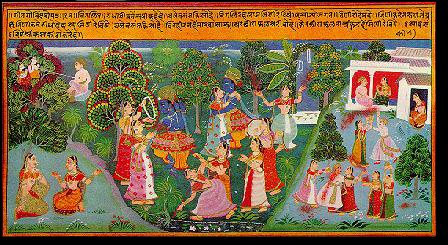Tweet

"Vigalita...Sri Krsna krida kare hen."
The fragrance of saffron orange flowers is replaced here with the perfume of ketaki (kevara) with its cactus like spikes, which pierce the sky. These spikes are now the arrows of love which wound lovers. Tender buds bloom into laughter as the gopis abandon their shyness. The painting faithfully incorporates these two central images of the verse and adds one more of the scent of twining creepers, which mingle with the perfume of garlands. In fact, this last is the first line of the next verse.
Radha and the sakhi shrink into one corner. Above, a couple sits amidst the ketaki trees and is smitten with spikes of the tree. The three figures seem as if floating in space. In the center Hari is seen twice. Once, He is being garlanded by a gopi as another clasps, a second time he holds a gopi. Four others dance in gay abandon. The phrase "vigalita lajja" is forcefully brought out by the stance of one gopi, who has lost control in this dance of abandon. In a third area, the season of Spring on earth is portrayed by men and women singing and dancing in response to the rich mood of Spring. As in a few other preceding leaves, terrestrial and celestial space are clearly distinguished. The air of Spring permeates the total composition.

